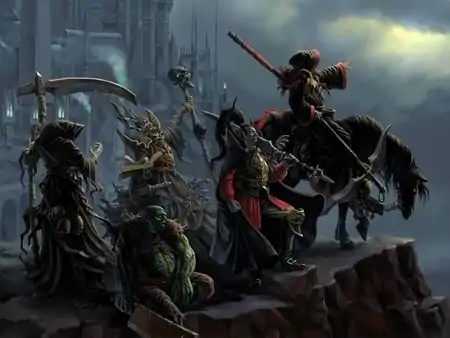Tome of Necromancy (3.5e Sourcebook)

|
Tome of Necromancy
Unlike the Revised Necromancer Handbook, which is a compilation of the Necromancy rules as they stand, what you are reading now is the rules for Necromancy as they should be. We feel there is a need for this because despite (or let's not kid ourselves, because of) the considerable amount of space spent given over to Necromancy in officially sanctioned products, the classical Necromancer does not function under the rules as written. Vampires can't run or be staked, there aren't any prestige classes that make you any more of a necromancer than you are with the base classes, and honestly noone even knows how the basic necromancy spells work. Not because they are stupid, but because the rules for such things are contradictory in several key places.
The Morality of Necromancy: Black and Gray
The rules of D&D attempt to be all things to all people, and unfortunately that just isn’t possible if you’re trying to make a system of objective morality. By trying to cater to two very different play styles as regards to the moral quandaries of the use of negative energy, the game ends up catering to neither – and this has been the cause of a great many arguments for which there actually are no possible resolutions. Ultimately therefore, it falls to every DM to determine whether in their game the powers of Necromancy are inherently evil, or merely extremely dangerous. That’s a choice which must be made, and has far reaching implications throughout the game. That’s an awful lot of work, and most DMs honestly just don’t care enough to be bothered with it, and I understand. Fortunately, we have collated those changes for you right here.
For additional options and information, please see Morality
Necromancy with Class
The degree to which the published classes of Necromancy aren’t good causes people physical pain. The degree of malarkey that people are willing to attempt in order to use these classes in a half-way level appropriate way causes us physical pain. While the flavor of published necromantic classes is frequently adequate or even engaging – the mechanics just aren’t there. You shouldn’t have to cheat just to make a concept character nearly the equal of a standard Cleric or Wizard. As a solution, we propose having actually mechanically viable prestige classes for the necromantically inclined to use.
For additional options and information, please see Necromancy with Class
Necromancers with Style
For additional options and information, please see Necromancy with Style
The Necronomicon
Necromancy as a school is possessed of some of the most powerful and game defining spells ever imagined in the worlds of Dungeons and Dragons. Magic jar, wail of the banshee, and clone can practically be a world threatening plan for a BBEG all by themselves. In fact, that's been done several times. But Necromancy as a school suffers greatly for this attention. Though the earth shaking power for dark lords is well represented, the low levels of necromancy have been largely ignored by generations of authors. It is our intention to produce a short list of spells that allow a low level Necromancer to be memorable and effective without constantly falling back on the old stand-by of having Spell Focus: Conjuration.
For additional options and information, please see The Necronomicon
New Rules
The interaction of Undead with the rest of the rules is often less than satisfactory. Part of this is that the undead type itself is extremely overzealous in the game effects it provides. The fact that all undead don't need sleep means that vampires don't have to sleep in their coffins. The fact that undead don't have a Constitution score means that Ghouls can run for exactly zero rounds before they have to make a Con check (that they automatically fail) to continue (and also says it can "run on indefinitely", a base contradiction that makes us sad). The fact that undead are immune to critical hits means that a vampire can't be staked through the heart (even if it was sleeping, which it isn't). But even beyond that fundamental error, the multitude of authors that compromise the Dungeons and Dragons design staff never seemed to get on the same page as to exactly what being undead means – so a surprisingly large number of contradictory statements pepper the products.
And I'm not just talking about how they made an entire Deathless Type when there's already Ghosts (Alignment: Any) right in the core rules.
For additional options and information, please see New Rules
Back to Main Page → 3.5e Homebrew → Sourcebooks
View recent changes for all Tome of Necromancy sourcebook related pages

